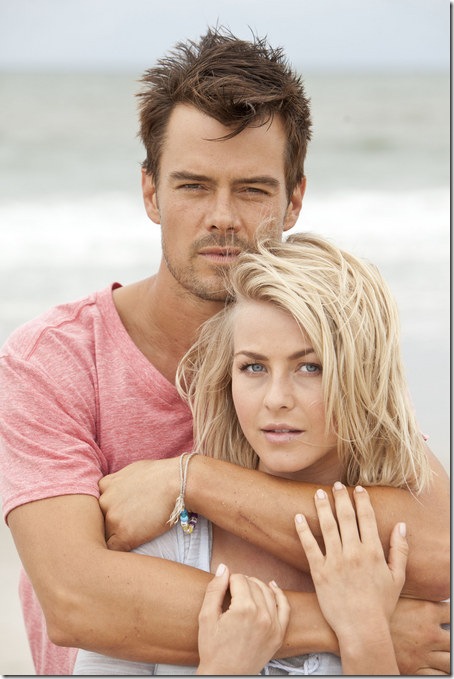Intriguingly, Lasse Hallstrom’s Safe Haven opens as a horror film: A young, bloodstained woman runs panicked through a suburban street after dark, having either killed someone, nearly died herself, or both. She finds refuge in the home of a neighbor, her first step in fleeing the darkness behind her.
The moment could have been cut and pasted from a Scream movie, but it’s just the first of the first of many emotional textures Hallstrom will explore in just under two hours, from sappy rom-com to old-fashioned melodrama to curdling suspense and supernatural love story. He becomes not a director so much as a mixologist of genres, crafting a fitfully engaging, intermittently silly mass-market cocktail.
Of course, Hallstrom, a Swedish director of note who emerged onto the world cinema stage with the tender 1985 drama My Life as a Dog, can only assert his authorial hand so much without overwhelming the real star: Nicholas Sparks, who wrote the book on which the movie is based. Sparks has written only one screenplay, but his signature is all over the myriad chick flicks that have been adapted from his best-selling airport novels: A Walk to Remember, The Notebook, Nights in Rodanthe, Dear John and The Lucky One. Truth be told, I’ve never seen any of these pictures. Respectable critics don’t like them, and after seeing just this one, it’s easy to discern why.
Safe Haven, for one, bombards us with overwrought musical cues for every mood, and with characters that fit neatly into proscribed good guy/bad guy roles, as morally ambiguous as Jesus and Satan. Everything is explained to a fault, every stone is turned and re-turned, and its cuteness, while certainly appealing to some viewers, will be nauseating to many others. Nearly every plot turn is at the service of bringing its attractive leads closer together; even accidents, mistakes and inclement weather are less real-life roadblocks than pheromone-laced magnets for its leading actors.
Relative newcomer Julianne Hough plays Katie, the fleeing damsel in the opening passage who, after transforming her hairstyle and identity, manages to escape on a bus from her hometown of Boston en route to Atlanta. A pit stop in the idyllic seaside town of Southport, N.C., ends being her new permanent home — all the while being pursued by an unusually committed Boston police detective (David Lyons) who wants her for murder.
In Southport, everybody knows everybody, and there are no Walmarts; there are only mom-and-pop general stores run by attractive and eligible proprietors of the opposite sex and their adorable, dentally challenged daughters. Alex (Josh Duhamel) runs the shop, a guy too young to be raising two motherless children. Turns out his wife died of cancer; tragic, yes, but excuse my cynicism at Sparks, et al., for gifting this saintly individual with a back story so uncheckered that it would make Gandhi rolls his eyes.
There are two major, shocking twists in Safe Haven; one of them is terrific and frightening, and the other is really stupid, reminding us that just because something surprises us doesn’t mean it’s appropriate for the world the characters inhabit. To the extent that the movie works at all — it’s pretty to look at, from the postcard locations to the attractiveness and charm of its two leads — it’s because Hallstrom is still a strong actor’s director and a polished storyteller. He works wonders with the film’s jolting climax, set amid a Fourth of July parade. The entire, perfectly over-the-top set piece even reminded me of the entrancing conclusion of Vincente Minnelli’s Some Came Running.
Here and elsewhere, Hallstrom exhibits a flair for melodrama with a vintage sheen. It’s not quite Douglas Sirk, but it’s not a Lifetime movie of the week, either. If Sparks’ source material didn’t get in the way so much, we might have had something here.
SAFE HAVEN. Director: Lasse Hallstrom; Cast: Julianne Hough, Josh Duhamel, David Lyons, Cobie Smulders, Irene Zeigler, Red West; Distributor: Relativity; Rating: PG-13; Opens: Thursday at most theaters
